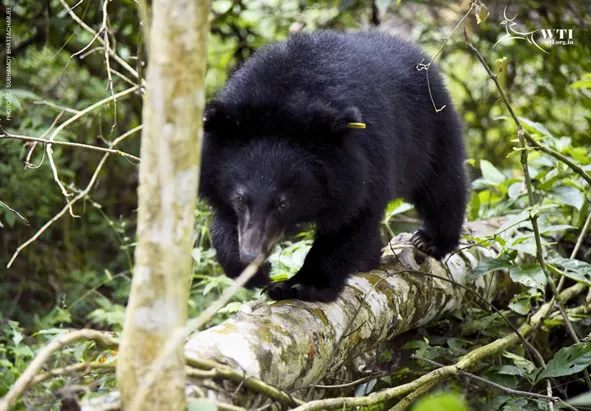ITANAGAR, 19 Dec: An 8-month-old orphaned Asiatic black bear cub was successfully rehabilitated and released back into the wild by the department of environment and forest Arunachal Pradesh, Wildlife Trust of India (WTI) and the International Fund for Animal Welfare (IFAW).
The bear was radio-collared and released in Pakke Wildlife Sanctuary and Tiger Reserve.
A male Asiatic black bear cub was rescued by the Sagalee social forestry department earlier this year and despite attempts to find its mother, she could not be located. As the cub was too young to survive on its own in the wild, it was admitted to the Centre for Bear Rehabilitation and Conservation (CBRC) in Pakke for nursing and care.
Jointly run by the Wildlife Trust of India (WTI), the International Fund for Animal Welfare (IFAW) and the department of environment and forest Arunachal Pradesh, CBRC is the only facility in India, dedicated to hand-raising and rehabilitating bear cubs.
After months of care and specialised rehabilitation provided by the dedicated team of veterinarians and keepers at the centre, the cub underwent a soft-release procedure. This process involved daily walks into the forests where the WTI-IFAW keepers guided the bear to develop essential survival skills. Over time, the cub started to exhibit signs of independence and adaptability and was deemed fit to be released.
The bear was successfully released earlier this week, in a suitable habitat by Satyaprakash Singh, DFO, Pakke Tiger Reserve, Vivek Menon, founder and ED, Wildlife Trust of India, Azzedine T. Downes, president and CEO, International Fund for Animal Welfare, and Nima Phuntsok, circle officer, Seijosa, Arunachal Pradesh. The bear was radio-collared to facilitate post-release monitoring.
More than 50 orphaned Asiatic black bear cubs have been successfully reintroduced into their natural habitat by the CBRC team since its establishment in 2002. Additionally, the team has assisted the state forest department in the rescue and translocation of 35 Gibbons and the rehabilitation and release of 107 other wild animals.





